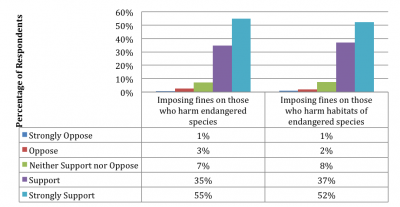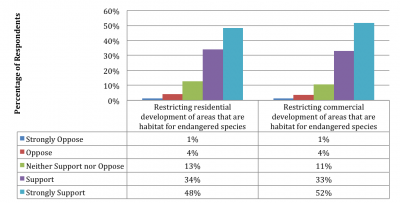 Floridians take a hard stance when evaluating punishments and restrictions designed to protect and manage endangered and invasive species, according to results from a UF/IFAS Center for Public Issues Education public opinion survey.
Floridians take a hard stance when evaluating punishments and restrictions designed to protect and manage endangered and invasive species, according to results from a UF/IFAS Center for Public Issues Education public opinion survey.
Ninety percent of residents supported or strongly supported imposing fines on those who harm endangered species or their habitat, and 80 percent approved of the state government buying land that shelters endangered species to ensure their protection. Similarly, 82 percent supported or strongly supported restricting residential development to protect endangered species’ habitats and 85 percent would place the same limitations on commercial development.
PIE Center researchers added questions to this year’s endangered species survey to measure Floridians’ knowledge, attitudes and behaviors of invasive species, associate director Alexa Lamm said. More than 500 Floridians responded to the online survey, which is designed to represent the entire state according to 2010 Census information.
 Floridians were relatively unconcerned about the cost of controlling invasive species, when asked how government agencies should prioritize certain factors. Residents instead felt the government should prioritize management of the damage invasive species cause to native species, humans, agriculture and property. Floridians believed the people who introduced the invasive species should foot the bill, followed by the state and federal governments. Only 25 percent indicated that citizens should bear some of the cost.
Floridians were relatively unconcerned about the cost of controlling invasive species, when asked how government agencies should prioritize certain factors. Residents instead felt the government should prioritize management of the damage invasive species cause to native species, humans, agriculture and property. Floridians believed the people who introduced the invasive species should foot the bill, followed by the state and federal governments. Only 25 percent indicated that citizens should bear some of the cost.
However, the majority of residents would be willing pay a 1 percent increase to the sales tax for managing endangered and invasive species. Their support waned as the price rose — 27 percent at most would support a 5 percent increase.
“We saw similar results in our water quality and quantity public opinion survey,” said Lamm, an assistant professor in the Department of Agricultural Education and Communication. “People are in fact willing to put their money where their mouth is when it comes to addressing these critical issues but only to a certain point.”
The survey is part of the PIE Center’s series of public opinion research. Other topics include water quality and quantity, immigration and food production practices.

















